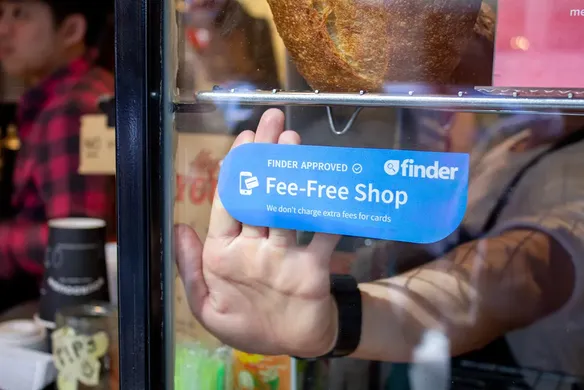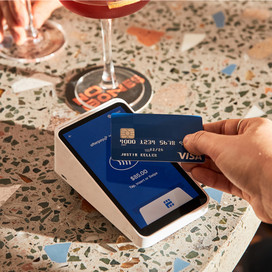The cashless economy is growing rapidly in Australia, with a recent study conducted by Square revealing 81 per cent of consumers now prefer cashless payments, and one in three are in fact card-only shoppers, carrying no cash at all.
A shift in the mindset of business owners, away from cash, was also highlighted in the study with a majority acknowledging that going cashless would reduce time waste for their staff, meet customer preference to pay by card, and increase security.
While we know the benefits of card and digital payments are clear, absorbing the cost of these systems is still a point of contention among for business owners, with many recouping the expense through surcharging (charging customers extra fees to pay by card).
This week, our friends at comparison site finder.com.au, kicked off a new Finder Fee-Free shop campaign to celebrate stores around Australia operating without a card surcharge and minimum spend requirement.
Why are they doing this? We caught up with Money Expert, Bessie Hassan, to find out more.
How did this campaign come about? Tell us some more about the regulations on surcharging.
As we become a cashless society, customers shouldn’t be charged fees for simply choosing to pay by card. In fact, the team at Finder believe surcharges and minimum spend requirements should be a thing of the past.
It is now illegal for businesses to charge more than the amount it costs them to accept card payment. Which means you can only legally pass on the cost that you incur to process a card payment. While there currently are no laws around minimum spend requirements, we know they encourage increased spending and/or unnecessary purchases for customers so we also think they should get the flick.
The Fee-Free Shop campaign has been created to celebrate businesses that don’t enforce these outdated fees.
Why should businesses sign up to the campaign?
Businesses can feel proud knowing they’re helping Aussies make better informed decision on how and where to spend their hard-earned money. In the spirit of the campaign name, it’s fee-free to get involved and simple to self register, and consumers can nominate their local fee-free shops too.
Is there any evidence that suggests businesses lose out by charging their customers card fees as explicit surcharges?
According to a new finder.com.au survey of 2,012 Australians, 94% of consumers think card surcharges are a rip-off. Additionally, more than two thirds (68%) of Australians would back out of a purchase if they discover a surcharge will be applied. Businesses most certainly lose out if if consumers vote with their feet.
How can businesses make up the cost they have to fork out on card fees?
We understand that operating a business in Australia is expensive but in our opinion it isn’t fair to pass all these costs on to customers without their knowledge. There’s countless ways for business owners to absorb the costs associated with payment processing. For example, businesses can:
- Build some of the costs of all their business expenses (including processing fees, rent, staffing etc.) into the pricing structure for their product and services
- Find ways to reduce other business expenses
- Internally assess and eliminate any inefficiencies that exist within current business processes
- Check supplier invoices for overcharging and double billing or, better yet, switch to cheaper suppliers
Our research shows that handling cash can be expensive for businesses as well. Is that something you have seen through your research?
There is undeniably a cost associated with handling cash however our research focused on the cost to the consumer. According to the calculations, credit card surcharge fees for coffee purchases alone could be collectively costing Australians $110 million per year.
The study also revealed the public opinion of surcharges, where surcharges are most common and who the biggest targets are.
What can businesses do if they think their card fees are too high?
There are a number of payment processors, each with their own fee structures – Square, for example, has one flat fee for all card types, whereas other providers have different fees for different card types.
If business owners feel they’re paying too much in fees it’s time to compare their current service, and associated fees, to that of another provider. Doing a comparison exercise will give them all the information they need to make the best decision for their business moving forward.
What should businesses look for when choosing a payments processor?
Choosing a payments processor is no different to choosing any other financial product – there’s no one-size-fits-all approach.
It is important to do your research, compare providers, read the fine print and most importantly, ensure it is going to suit the individual needs of your business.
![]()











